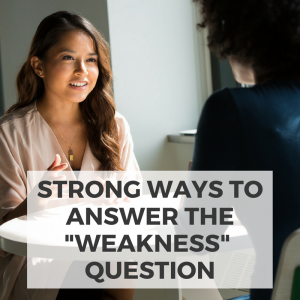
What’s your greatest weakness?
I think we’re all familiar with that famous interview question: What’s your greatest weakness?
Cue the eyeroll. This question, though considered important to employers, is so common that the answers themselves are all too common. You’ve heard the typical, “Well, my strengths can actually be seen as weaknesses.” Please do not do this; employers see right through it. Instead, here are some pointers on how to best answer this impossible yet inevitable question.
Do not deny that you have any.
First, we are human. We have weaknesses. If you resort to denial, it will be obvious to the employer that you’re afraid to bring up your mysterious weaknesses. Try to avoid this at all costs.
Be honest.
Take a moment and really think about where you could be improving. Here’s a tip: don’t exclude your weaknesses from your personal life. If you struggle with organization or keeping things clean in your personal life, you could probably use that as your weakness in your professional life.
But not too honest.
If you’ve had a record of being late to work or not showing up in the past, maybe keep that under wraps. But also, fix that on your own. Be wise on what could and could not be seen as detrimental to the specific position you’re interviewing for. Meaning, identify the key skills and characteristics you’d need for the job and choose one that’s not an essential skill for the position.
Open lightheartedly.
It’s not a bad idea to start out with a playful answer, like, “Chocolate.” Then, laugh it off and continue with an actual honest answer. Something like this sets the mood in a positive way, allows you to cut loose, and buy yourself some time.
It’s in the past.
You can always point out from the start that you “used to have a problem with…” and follow up with the fact that you’ve improved upon and conquered it. You may even be more honest by saying, “The problem may still crop up here and there, but I have my ways of counteracting it.” Then, mention in detail the coping mechanisms and ways in which you do counteract the problem.
My Answer Broken Down
“That’s an interesting question.” (Buying time.)
“I don’t really think of myself as being weak,” (Not denying, but standing strong.)
“…except maybe at avoiding French fries.” (Lightening the mood).
“Self awareness is the key to all growth and development, and I am always aware of what I want to get better at.” (Being humble and honest.)
“In my business life, I do have one thing I am working on right now: being a better listener.” (Pinpointing an honest weakness that isn’t detrimental to the position at hand.)
“In any profession and at home, getting better at listening will make me even more successful.” (Explaining the importance of improving, and the fact that I am improving.)

